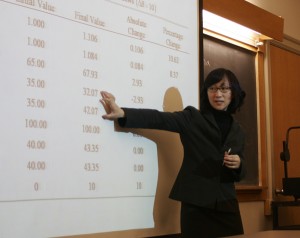
While candidates from various academic fields flock to Grinnell to give presentations in hopes of gaining employment as professors at Grinnell, the College is working to figure out how to hire in the face of a smaller endowment.
Rather than retracting job offers due to budget constraints, Grinnell plans to continue with hiring all advertised tenure-track positions. However, fewer proposals for term positions—one- or two-year positions that serve as stopgaps in departments—will be approved.
Seventeen tenure positions will be filled for next year, including five new positions, three of which are through the Expanding Knowledge Initiative (EKI)—the College’s plan for enhancing interdisciplinary teaching and scholarship. “We don’t want to make decisions now and be overly cautious and lose momentum on implementing things like the Strategic Plan and the EKI,” said Associate Dean and Professor of Biology Leslie Gregg-Jolly.
According to Chair of the Faculty Mark Schneider, Physics, vacant positions are not automatically filled by term professors and will be reevaluated to consider the current needs of students and faculty. Every year departments submit more proposals for term positions than are actually filled. “This year there might be one or two less positions filled,” Schneider said.
However, the College may need less term professors than prior years. The reliance on term professors on the whole is less than in past years due to the recent trend toward expansion of tenure faculty, Gregg-Jolly said.
Faculty salaries are likely to be affected as well. “One of the things that is happening is that the raises, both on the faculty side and the administrative side, are going to be dramatically lower than in past years,” Schneider said. “While in a typical year a faculty member might get a raise of five percent … we’ll be looking … in the ballpark of one percent.”
Administrators and faculty alike stressed the fact that although Grinnell is in a fortunate financial position in comparison to many institutions, there will still be academic cutbacks. “It is important that we all recognize the severity of the situation,” said Victoria Brown, History department chair. “We are very lucky, but we have to be careful.”
The issue of the reduced budget and both its short- and long-term impact on academic positions are far from solved. The Trustees have postponed approval of the budget until April in order to gain a clearer sense of the future of the market and how to navigate the financial waters.

















































